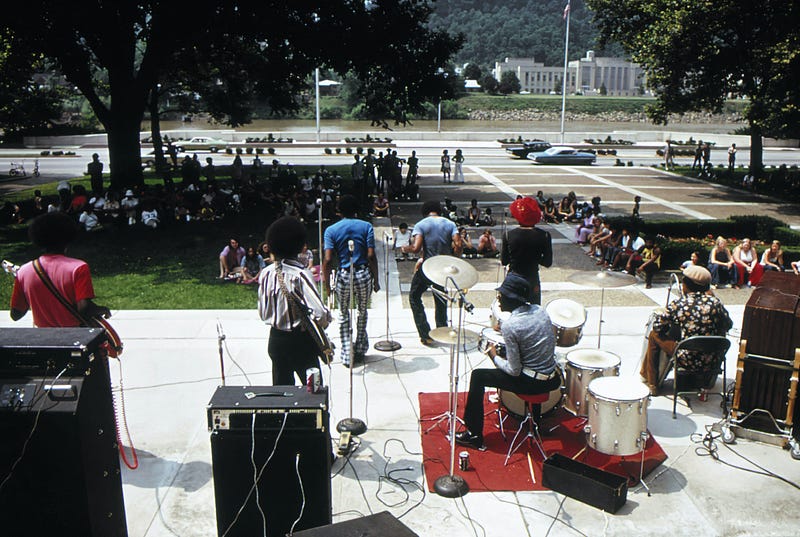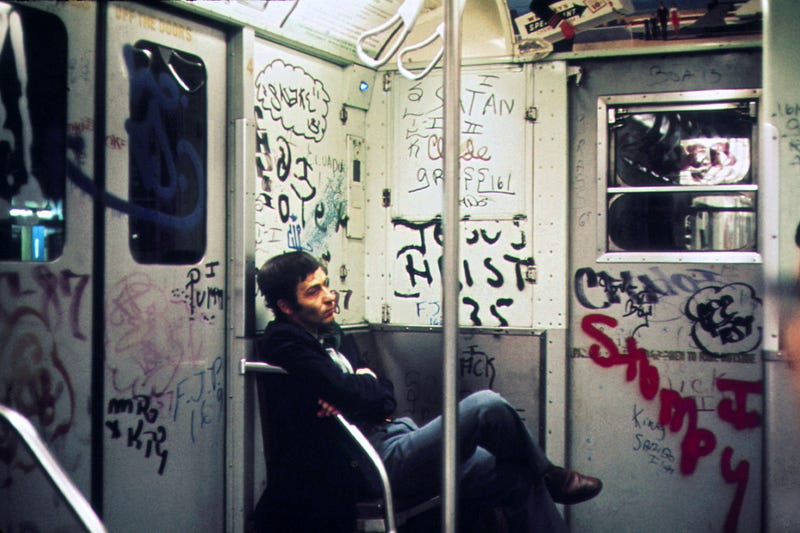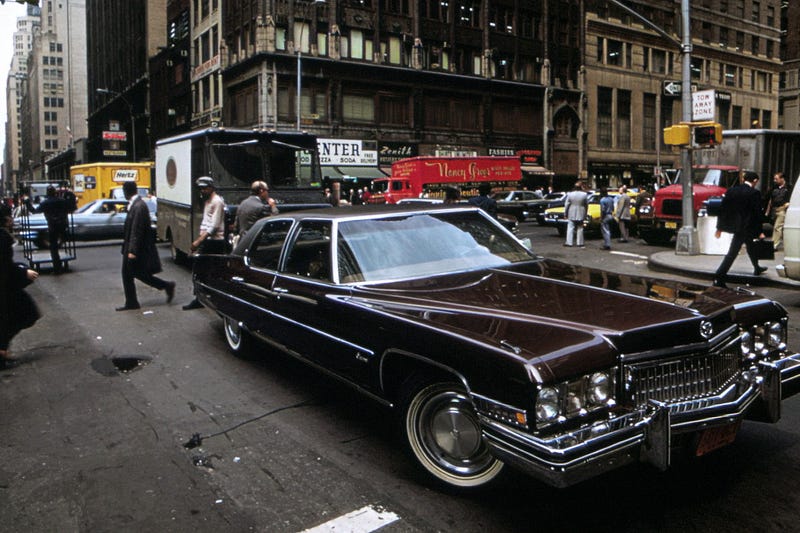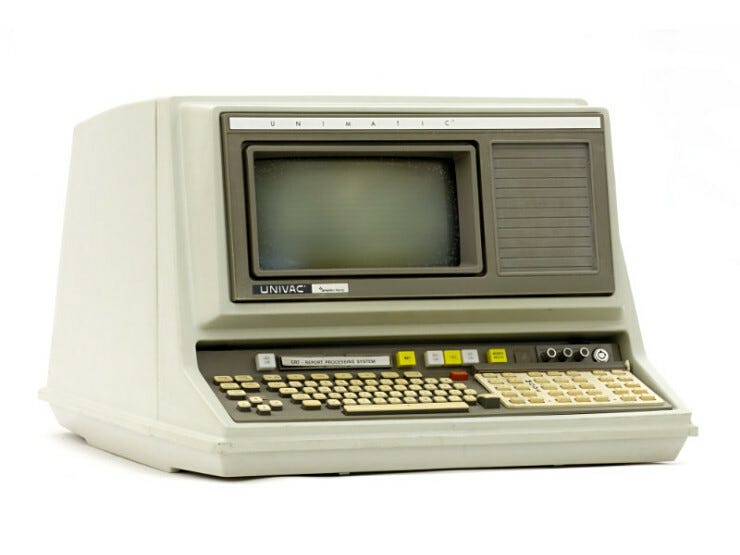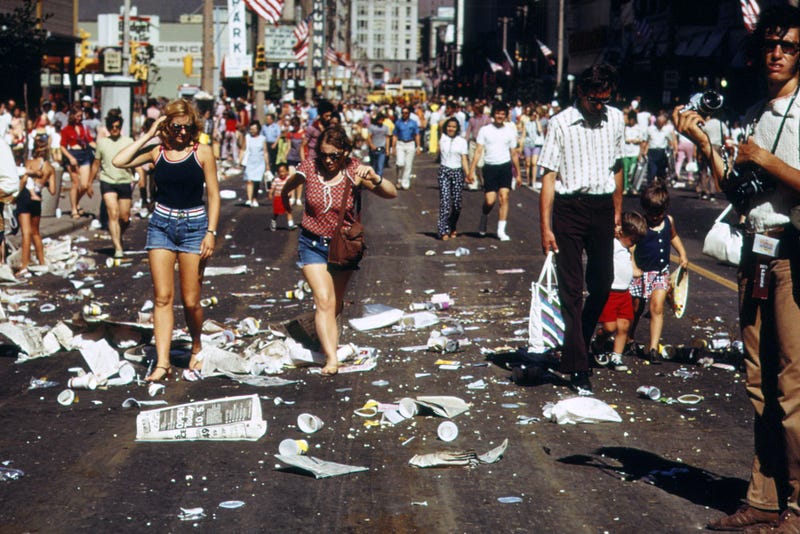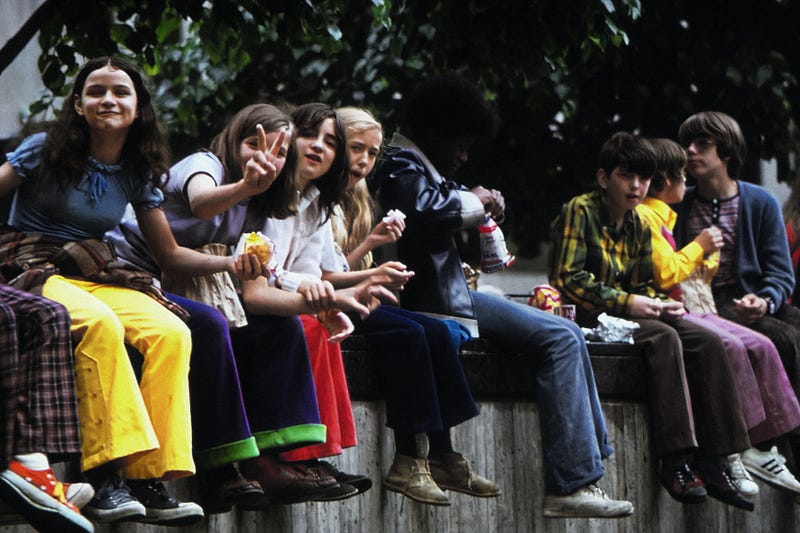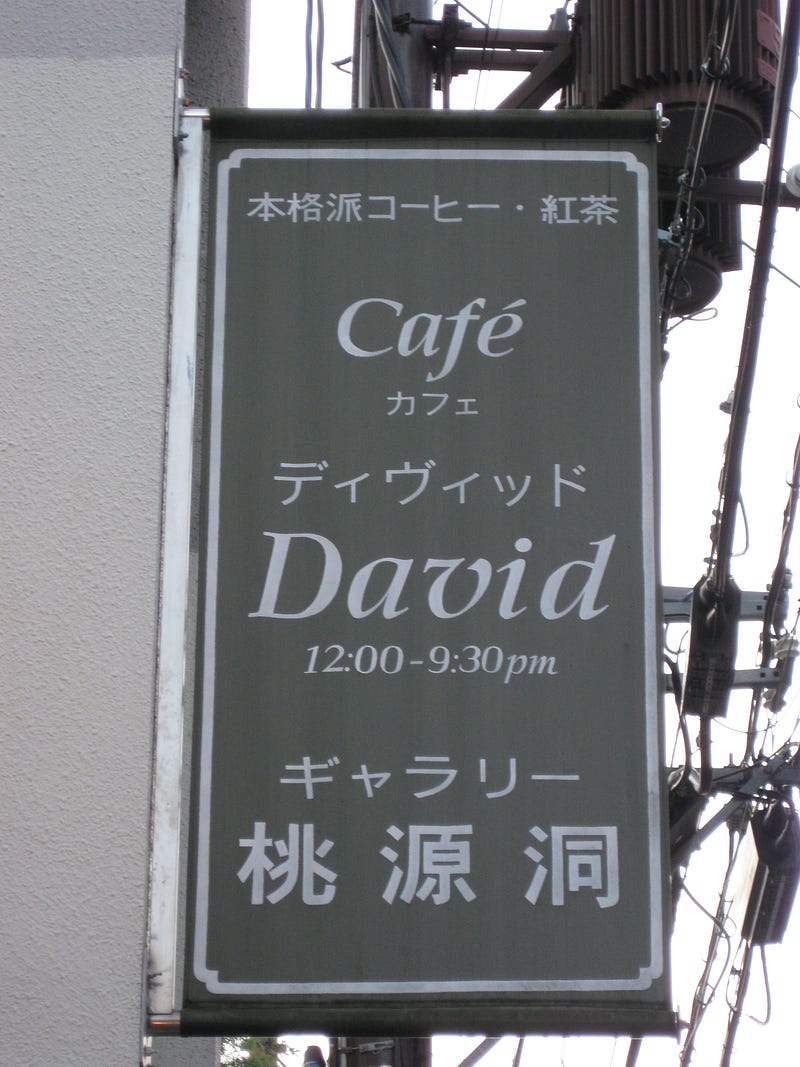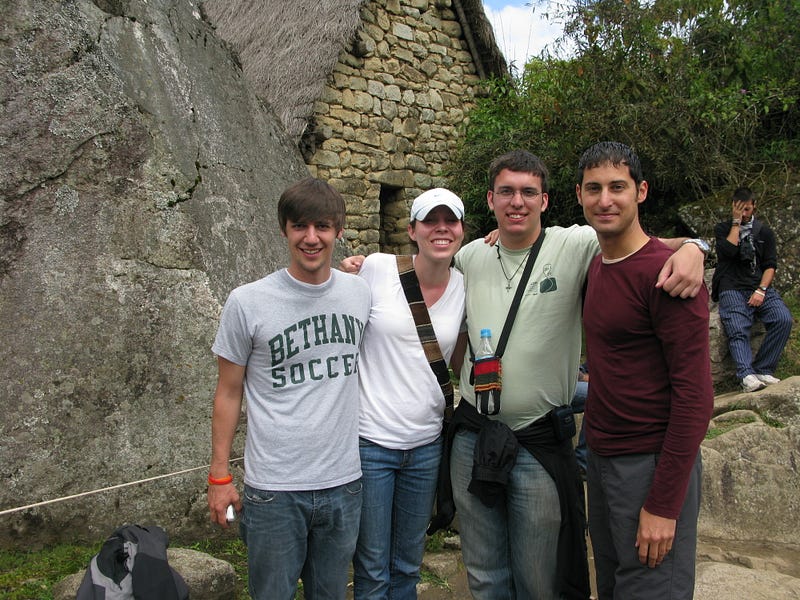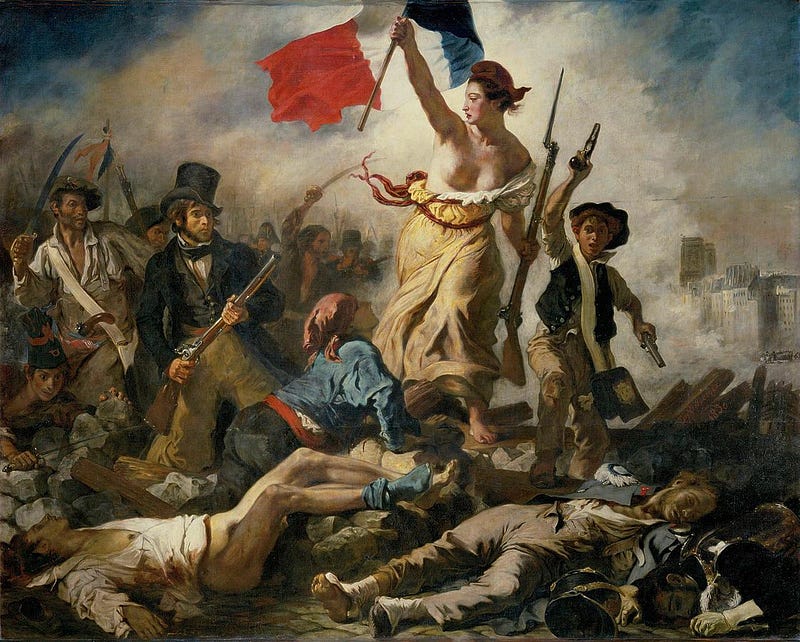Six months after October 7th, a long, winding journey through histories personal and political

Start with a crazy thought: Born and raised Jewish, I’ve never once personally experienced antisemitism (also known as Judeophobia, a more accurate term for the phenomenon, and one I’m using from here on out).
Maybe I was just lucky. Or maybe my parents and community did their part to shelter me from such cruelties. Or maybe, in spite of all my wanderings and travels, I’ve managed to remain in a bit of a bubble. Or maybe a little of all those things.
Of course, I know about Judeophobia. My background made good and sure of that. I’ve studied it, like, a lot. I was made to watch Holocaust documentaries as a tween (whether that was altogether healthy, I’m not sure).
And yet, one thing glares out at me though it all: though we all know what Judeophobia is, on a most profound know-it-when-I-see-it level, the question that is never answered is, well, why it is.

What is this thing called Judeophobia?
Think about it for a second. Homophobia (hatred of another group I belong to, and yeah, I experienced it many times) has at its core a certain messed-up, twisted logic: since sex between men and women is for procreation, anything that’s not that is no bueno. Critics would be quick to jump out and claim homophobes somehow seem fine with hetero sex that’s not for making babies. True… except even that has been verboten in ages past (and present, sadly).
Ditto racism. People look different than you, so that creates the perception of a threat. All sorts of junky, fallacious science was dreamed up to justify it over the centuries.
Religious wars come closer to answering the question. After all, if Protestants can battle Catholics as in Northern Ireland—or, heck, if all Christendom can mount literal Crusades to retake Jerusalem from the Muslim saracens—well, doesn’t the hate for the Jews make sense on that level? More broadly, doesn’t it just seem that humans have this awful penchant to hate and fear the different, the unknown, within the species? Call it a most toxic flavor of Freud’s narcissism of small differences.
For me, though, that answer never fully satisfies. For one thing, as a corollary to my theory that nearly all wars are resource wars, it can be seen that most, if not all, of these religious wars operated in tandem with the grit of statecraft. This country wanted that country’s land/resources/enslavable population/perception of glory. Think vast armies clashing on medieval meadows, captured with striking artistry by painters of the Renaissance.
But the Jews are no such people. They possess no great resources; even studies of their wealth and influence—clichés notwithstanding—sees Jews in America doing roughly as well as some other groups. They’re one of recorded history’s most ancient extant faiths, but bearing a heavy mythos and elaborate traditions—plus an aversion to proselytizing—they’ve always been few in number. Even though punching above their weight in world influence in recent centuries, they’ve never taken center stage as the world’s pre-eminent peoples the way, say, Christians, Muslims, or Han Chinese have done. It almost makes all the hate seem bitterly comical: why devote so much headspace (looking at you, Kanye) to some 0.2 percent of the human population? It borders on conspiracy theory.
The answer, I think, lies with Steve Jobs (not Jewish, but bear with me).
Think Different

Remember those late-1990s Apple commercials? A paean for the misfits of the world—which, at the time, included steadfast Apple users like me. Interestingly, the first two figures in the original ad from that campaign, projected in glorious slow-motion black & white, are both Jewish (Albert Einstein and Bob Dylan).
Platitudes about God’s Chosen People or deranged Zionist conspiracy theories aside, I think there’s no real magic here: just a laser focus on learning (a superpower in the age of knowledge and industry) and a position (sometimes advantageous, sometimes not) astride two of the largest faiths on Earth—ones that Jewish culture helped start. Actually, that’s likely part of the reason for all the hate, too: even at their most openminded, Christendom and Islam have always felt an Other-ness about that small group of monotheists who didn’t want to be their kind of monotheists. That narcissism of small differences again.
Still, all those reasons don’t fully capture it for me. There’s more, something that I think lies beneath all these reasons. This brings me back to Steve Jobs and those commercials, and leads me to my boldest statement about my culture of origin.
I believe the Jews to be the Think Different people of humanity.
The nerds of our species, as it were. To indulge in cliché for a minute, it’s no coincidence that the dorky persona in popular culture is frequently portrayed as, dare I say it, a tad Jewish-y (big nose, glasses, messy hair, studious). Think Woody Allen, who alone has sufficient notoriety to practically personify what I’m talking about.
Different also means noticed. Willful divergence from the mainstream of humankind may hold great potency, but also courts fatal attention.
Consider the heyday of pagan polytheism, some four thousand years back. In come these ragged old patriarchs fulminating in the desert about a singular abstract, universal super-being (by the way, the term for such an entity in the sci-fi series Dune—the Kwisatz Haderach—stems from two Hebrew words). Or the notion that what we believe in deep within our hearts—orthodoxy—is more important than simply going through ritual religious motions—orthopraxy. This actually holds another clue, since it introduced the burden of a guilty conscience—and in the words of essayist Maurice Samuel, “no one likes an alarm clock.”
It doesn’t stop there: how about the notion that workers, indeed all people, should have a day of rest. Or that we should avoid certain foods (the origin of which may have been dietary, but has since gone in a totally different direction). Or that we shouldn’t proselytise others. Or that the strategic land bridge between Africa and Eurasia—literally humankind’s first rest stop on the long march out of our ancestral cradle—would be a good place to call home. Or that we should focus, to the point of obsession, on the study of a few select texts, interpreted and reinterpreted to death. Or that all these things would spawn two of the world’s biggest religions—both of which the Think Different people would subsequently reject.
People say Judeophobia has morphed and changed through the centuries. I’d argue part of the reason is that its target has done the same. The Think Different people are an ever-shifting innovation. Where once Jews practically invented patriarchy and homophobia (sorry), nowadays it’s Jewish reformers on the front lines of women’s liberation and LGBTQ+ freedom. Where in ancient time the Israelites were rural and agrarian (and before that, nomadic herders), nowadays most Jews live in polyglot big cities.
And so Thinking Different invites ire. A lot of ire. Luminaries from Henry Ford to architect Philip Johnson to author Roald Dahl fell into its twisted thrall.
But it went even beyond ire; it surprised me to learn the Nazis felt a profound sense of victimhood, a notion that their kind was under threat of annihilation at the hands of the Hebrew menace. Untrue and deranged though that sounds, it helps when grappling with the obscene absurdity of it all, how a nation-state considered by many to be the pinnacle of human sophistication and achievement could build city-sized factories for the mass extermination of a people whose only real crime was, well, Thinking Different.
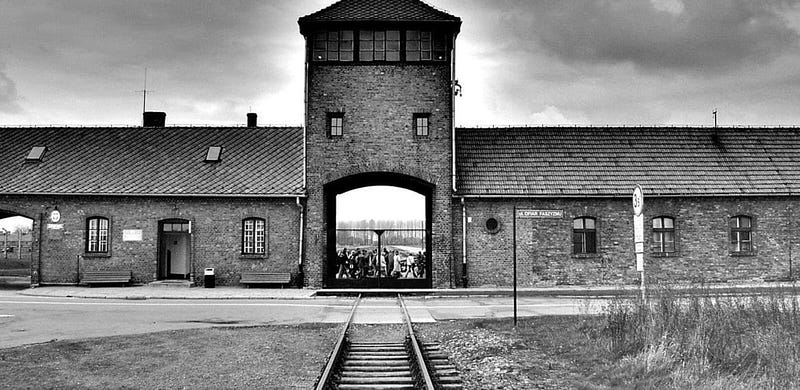
This is why the Think Different paradigm feels to me like the only unified-field theory of Judeophobia I can conjure up. I’m not alone in thinking this way either. It’s a potent force, the factor that ties together 1930s National Socialism, contemporary postcolonial leftists, and Islamists together. They all seem to find some way to hate the Jews, or the state the Jews built.
Story of my life
Let’s come back to where we started: as keenly as I’m aware of its existence, Judeophobia has never felt immediate to me. For that, I sometimes hear the Kathy Bates line from Primary Colors ringing in my head: “what a privileged fucking life you’ve had.” Well, maybe on that one front. But there’s more to my story (and, I suspect, many others) than that. And it’s more than just homophobia.
For one thing, my backstory was different than those around me—even set against fellow Think Differents.

On my Mom’s side, the family story started out Ellis Island, Canadian edition, with Eastern European Jewish families coming to the New World in the early years of the Twentieth century. But, sometime in the 1940s, their path took a hard left: my grandparents, members of the Greatest Generation, met while stationed domestically during wartime. Afterward, they gave up a life in burgeoning North America in 1947 to move to…a whole other war zone. They were part of a left-wing Zionist youth movement. Even though living on a kibbutz didn’t work out for them, they remained in Palestine, and lived its violent transformation into a Jewish state.

My Dad’s family, meanwhile, lived a life that was more Great Gatsby than Fiddler on the Roof or Exodus. Someone in the extended family found a way to make a fortune overseas, and it ended my grandparents up in luxury in colonial-era Shanghai.
Then, World War II came calling. A lucky fluke kept them out of internment camps, but not totally out of the war: my Dad would tell of Allied bombings over Shanghai, counting the length of a bomb’s whistle to guess its deadly proximity. They made it out intact, and spent two years in more luxury in postwar Italy…only to be followed by decidedly less glamorous experiences once they reached these shores. As in: they somehow found a way to lose everything they’d made across the world.
Talk about really Thinking Different.
Maybe because of all this difference, my parents turned out, like, super-Jew-y. Borderline Born Again. On their first date—a blind fix-up in London where they were both on holiday in the Swinging Sixties—they pledged to raise their kids with the traditional Jewish background that they’d missed out on in their respective youths. My sisters and I attended Jewish day schools, from infancy through the end of high school. Our entire social circle—nay, my entire world—was pretty much all Jewish until I was eighteen years old.

Do not be fooled, however: we were not treated as some sort of Jewish aristocrats, as I think my parents sometimes fancied themselves. For me, freak better fit the way I (didn’t) fit it. Part of it was economic: we found ourselves on the ragged edge of our tight-knit community’s upward mobility. More of it was geographic: I got teased because my (White) father was born in Japan, and his background didn’t follow the Ellis Island backstory of everybody else’s bubbe and zayde in my class.
And—yes—the homophobia: my urban, liberal community in the 1980s was no better on that front than anywhere else in John Hughes America. It might as well have been John Hughes America, or any other bougie quasi-suburb, Jewish or otherwise. Blink, and it’s Skokie or Evanston, near Chicago; Squirrel Hill, near Pittsburgh; Shaker Heights, near Cleveland; or Scarsdale, near New York City. A place where, in spite of growing up among my kind, I felt wasn’t my place. I was, in short, one of writer Blake Flayton’s (a thoughtful young queer Jewish journalist with a similar background) Jewish summer camp victims. Not because of religion or dogma; more because sometimes even the Think Different people don’t always rise above humanity’s more ignoble impulses to ostracize and exclude.
So what? It seems so insignificant next to the fact that, according to the FBI, some 60 percent of all religiously-motivated hate crimes are rooted in Judeophobia. How the heck can anyone complain about minor misbehavior of some community cohorts when, well, all that is going on?
Different shades of different

Here’s where those campus leftists come back into the picture, and where my experience partly intersects with those recent charges of Judeophobia in academe. Part of that charge is my belief that—in contrast to progressive politics’ support for visible minorities and LGBTQ+ folks—liberal academics seem to have a massive blind spot for the Think Different people. Sure, Jewish immigrants may have been the huddled masses of yesteryear, but in today’s world? Just more White folks. It’s an ironic reversal, some have noted, from when over a century ago race science demonized Jews for being not White.
Meanwhile, my crowd mostly pursued more banal aspirations: score good grades in school; attend a top-ranked university; grow a business, or else build a killer career on Wall Street. Marry, reproduce, repeat. Little boxes on a hillside, all made out of ticky-tacky, and they all look just the same (BTW, writer of that ditty? Jewish; more on that below).
It’s been a slow, tangled process for me to disconnect Jewish identity from all that narrow meritocracy. The Think Different crowd has embraced it so passionately that they’re hated for that, too: recall the psychotically hateful fulminators bearing Tiki torches and chanting Jews will not replace us.

It’s absurd, particularly in a country and society that celebrates succcess. But it’s also incorrect. Because the Think Different people are so much more than that. The character played by queer pop singer Troye Sivan (Jewish) delivers the most fitting line in Jared Frieder’s (also Jewish) film Three Months, “there’s like six types of Jewish people, and I wanna say…two are pretty fierce?”
Here’s to the fierce ones
They’re what keeps me coming back to my roots, those fierce types. Likely the reason I still Google every accomplished person who I think is a Member of the Tribe to confirm it. Because some Think Different-ers helped spawn a cosmology, an entire universe of better angels. In particular, a loose grouping of modern-day scientists, writers and philosophers who embody what I’m going to call Saganism. It’s the worldview potently articulated by (who else) Carl Sagan, as well as two of his forebears and contemporaries, Isaac Asimov and the above-mentioned Einstein. Add to this group some non-Jews, too: Arthur C. Clarke and Gene Roddenberry.

Here’s what Sagan said, upon seeing the tiny pinprick of Earth, taken from the faraway Voyager I spacecraft in 1990:
“Look again at that dot. That’s here. That’s home. That’s us. On it, everyone you love, everyone you know, everyone you ever heard of, every human being who ever was, lived out their lives. The aggregate of our joy and suffering, thousands of confident religions, ideologies, and economic doctrines, every hunter and forager, every hero and coward, every creator and destroyer of civilization, every king and peasant, every young couple in love, every mother and father, hopeful child, inventor and explorer, every teacher of morals, every corrupt politician, every “superstar,” every “supreme leader,” every saint and sinner in the history of our species lived there — on a mote of dust suspended in a sunbeam.”
Right?
I’ve lost count of the number of times I’ve watched the many YouTube renditions of this soliloquy, and wept. If that’s what Thinking Different entails, it had me at hello.
From the sublime to the tragic

Sadly, current times lean far from Saganist aspirations—particularly for the Think Different people and their neighbors, fighting in the homeland both claim as theirs. It seems Sagan’s own people are trapped in the very nightmare he lays out later in that quote:
“Think of the rivers of blood spilled by all those generals and emperors so that, in glory and triumph, they could become the momentary masters of a fraction of a dot. Think of the endless cruelties visited by the inhabitants of one corner of this pixel on the scarcely distinguishable inhabitants of some other corner. How frequent their misunderstandings, how eager they are to kill one another, how fervent their hatreds.”

Shortly before last fall’s cataclysmic events, a little-known film was touring the festival circuit, a documentary called Israelism. Produced by a couple of young Jewish Americans with a startlingly similar background to my own, it chronicles their questioning, and subsequent re-education, about the inaccuracies of their upbringing. Suffice it to say, it’s attracted no shortage of attention of late as the Israel-Gaza war rages on.
I’ve read and researched this subject widely—as with the Israelism filmmakers, much more widely than my one-sided early education. What strikes me about this conflict is how much both sides seem to talk past one another. Both point to atrocities and misdeeds committed by the other as a means of undermining the other side’s credibility.
What’s even more striking is how much attention the world is paying to all this when contrasted against other global flashpoints. Sometimes I wonder how Africans in the Sahel must feel, with their equally (or more) horrific conflicts largely ignored by the larger world, focused as it is on a few dozen square miles around the Mediterranean.
I know what the Think Different response to this has been, one my upbringing so often reiterated: Judeophobia, pure and simple. Unease with Jewish power. Rabid hatred of infidels by radical Islamists. Lingering prejudice still rooted in the subconscious of many Christian-derived Westerners—ironically, these days, found more often on the social-justice left than on the Hobbesian right.
Although I grew up with these notions, my later learnings added more nuance to my understanding of the conflict. Suffice it to say, while absolutely nothing justifies Hamas’ actions on October 7th, there’s a long history that offers insight into why this madness went down the way it did—and why the reaction was what it was.
A (very) quick catch-up: Israel has a long history of both fierce fighting and hefty global criticism, having racked up an almost comical number of condemnatory UN resolutions, along with past pushes for rapid cease-fires in prior wars. I always felt there were explanations bigger than mere Judeophobia: in Cold War days, there was the inevitable superpower jockeying, with either side trying to gain an advantage without blowing up the world. Moreover, for over a century the region’s been known to be oil-rich, and the fragile geopolitics of safeguarding this valuable energy asset have played a role in every adjacent conflict. Finally, Israel/Palestine is arguably one of the few bona fide civilizational clashes of the Samuel Huntington variety, pitting a largely Western-derived nation against non-Western religion, people, and ideology.
Claims and counter-truths
Watching recent events, particularly in the context of the longer history, led me to another conclusion, a partial explanation for the talking past each other. It’s not just the once-misled kids from Israelism. Lots of people from all sides have limited or incomplete knowledge of this admittedly dense history. Here are some talking points that I think need to be addressed:
Let’s start with from the river to the sea, that innocuous-seeming phrase, often suffixed with Palestine shall be free. Sounds laudable; who wouldn’t want to campaign for people’s freedom? It’s really more about what’s implied: that one people shall supplant another, or that the presence of one people is invalid and the other should occupy the entirety of the land. Leaving aside the logistical near-impossibility of relocating either party (each of which presently number around seven million), we need to ask ourselves if, in the modern age, this is really the right way to go. Maybe, for the sake of sanity, all parties agree to drop this slogan.
Let’s move on to anti-Israel, or rejecting Israel’s right to exist. Atop charges of hate or hostility, can we all agree these are absurd, and—maybe, possibly—Judeophobic notions? If a nation is viable, functional, has an engaged polity…then disputing its right to exist makes absolutely no sense. Does anyone dispute France’s right to exist? Mongolia’s? Brazil’s? Sure, nation-states are all made-up constructs, and lots of them have ignominious pasts. But they serve as the basic organizing unit of humankind in our age. Wanting that they should evolve, holding them to address their shortcomings, fix their problems…all are laudable goals for all the world’s nations, Israel/Palestine included. But a push to utterly eradicate any nation? That has no place in any sane discourse.
As a corollary to this, let’s take another notion: anti-Zionist. This is is usually taken to mean people who don’t support the notion of a Jewish state. Let’s unpack that. Zionism—like its constituent Think Different folk—has itself changed and morphed over the years. For right-wing religious Jews it may mean an exclusively Jewish homeland from the river to the sea. More moderate Israelis consider majority Jewish demographic numbers—which in a democracy is usually synonymous with access to the levers of power—an essential. I no longer count myself in either of those camps, but I don’t consider myself anti-Zionist. Quite the opposite.
Let’s take another claim: the charge of colonialism. Comparisons have been made between Israel and, say, Algeria under French rule, or India under the British Raj. Indeed, some of Israel’s later historians took a look at the evidence (some of it more recently declassified), and surmised that, yes, there was more going on than once thought: purchases of land from absentee landowners in Damascus, followed by kicking peasants off the land they’d farmed for generations to make way for new Jewish settlers; to say nothing of the formation of new (Jewish) towns and settlements apart from their Arab neighbors.
Not to be pedantic here, but this is sometimes described as settler colonialism — more like what was practiced in North America, Australia, or New Zealand. Even this charge is considered unacceptable, but I maintain that settler colonialism offers more of a platform to build a fairer society than the colonialism of the old-school kind. Countries built by people creating society afresh have, it seems, greater capacity to be held to ideals and eliminate past hypocrisies. Or at least try.
And—yes—as with other settler societies, displacement of peoples was often in the picture. Heck, Israel’s first Prime Minister, David Ben-Gurion, fretted about it years before the State of Israel came into being. Historians on both sides seem to agree that Jewish settlement in the land provoked violent responses from longstanding locals. But how did it all start? In my quest to find who threw the proverbial first punch between the 1880s and 1948, I’ve come up with no easy answers. Some maintain that Judeophobia was behind it, with Arab locals viewing the Jewish new arrivals with much the same disdain as European Judeophobes. Whatever the origin story, the Think Different crowd prevailed, and formed a state in the aftermath.
There’s another wrinkle to this colonialist charge: while Palestine hadn’t been under Jewish rule or control when those first settlers showed up in the 1880s, for millennia there had indeed been a vestigial Jewish population there. Not to mention a mythology that ran deep, and a richly-recorded ancient history.

Let’s move on to Gaza, a place depicted hellishly, as a densely populated, open-air prison—I’ve even heard charges of concentration camp—possibly bringing to mind the no-longer extant Kowloon Walled City in Hong Kong.
Here’s what the numbers say: if taken as a standalone country, at almost 17,000 people per square mile, Gaza is indeed up there, standing between Gibraltar (12,000 per square mile) and metropolitan Hong Kong (over 17,000 per square mile). It’s about a third smaller than the city of Chicago, and has almost as many people (2.3 million vs Chicago city’s 2.7 million). So it’s something like a city-state, or a microstate. That said, living in confinement in such a space doesn’t sound like anybody’s idea of a thriving existence, prison or otherwise.
More recently we’ve been hearing charges of genocide. Although more recently this has been a claim on the Palestinian side against Israel, after October 7th there was likewise the charge that those attacks were a newfangled variant of the late Russian Empire-era Judeophobic riots known as pogroms. While there’s no doubt that the suffering on both sides has been horrific, I don’t think either charge quite fits the circumstances. Going by the UN definition, a genocide incorporates willful intent to eliminate another group. While the Israeli military campaign has been heavily criticized for its excesses, it still seems at its core a military operation. Gaza hasn’t been nuked, nor has a significant percentage of its population (currently over two million) been wiped out. Although some of Israel’s more extreme politicians have made some truly deplorable remarks, they haven’t gone nearly as far as what we’ve seen in the historical record. Likewise, however messed up October 7th was, I think we can agree it’s nothing like the potency of the Russian Empire unleashing its citizenry on largely defenseless Jewish peasants.
Another misused word: Apartheid. There are resonances, but to me it doesn’t accurately describe the Israel/Palestine situation. For one thing, the conflict here isn’t racial; plenty of Jewish Israelis look like plenty of Arab Palestinians. I’d say that some measure of ethnocentrism has seeped into some parts of the discourse on both sides. But the major consideration for Israeli-Palestinian segregation has been geopolitical—relating to trust, security, rights, and resources. Israel’s policies could be termed Apartheid influenced. But they come from a very different place than the South Africa of old.
There must be some kind of way out of here
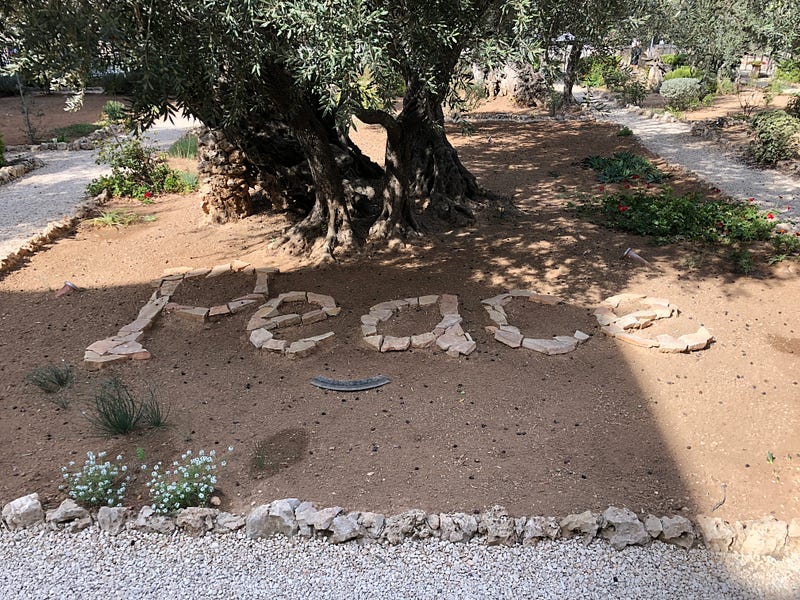
So how do we get out of this quagmire when we have two sides that can’t even agree on each other’s reality? Although I’ve read a lot, there’s always more to unearth and reveal. So I started with the granddaddy of latter-day Judeophobia, the 1903 pamphlet The Protocols of the Learned Elders of Zion. Nowadays, it’s said to be popular again, this time in—you guessed it— the contemporary Middle East.
Well…good grief. It’s hard to believe this deranged, fulminating, ludicrous fabrication—said to be minutes of a secret meeting of the great Jewish conspiracy—can be read as anything other than a cruel Python-esque parody. Then again, it’s in good company: look at some of the more extreme media in our fractured age.
Next I watched two almost identically-named stories on Netflix that could not be more different: Farha, an international co-production indy film from 2021 about the Palestinian displacement of 1948; and Fauda, a contemporary Israeli TV series that’s been running for several years and is surprisingly popular in some unlikely places.
Fauda’s terrific—a well-crafted thriller that manages to sensitively portray nuance on all sides. Even the critiques I did find of it made mention of the odd inaccuracy in accents or settings, but otherwise it does a good job of conveying the chaos of the conflict. Heck, its title literally means chaos.
Farha, on the other hand, came in for considerable controversy when it came out, and it’s hard not to see why: although the initial half of the film—depicting a young Palestinian girl hidden in a storehouse in a Palestinian village under evacuation—is harrowing enough, it’s the event the eponymous girl witnesses through cracks and peepholes of the storehouse that’s truly horrifying. Jewish soldiers enter the village, and basically treat any Palestinian they find—including an abducted informant—about as horrifically as some Nazis had done to their kin, just scant years before. Sadism, child murder, summary execution. Yikes.
Now, I know about stories of Arab villages depopulated by Jews during the 1947-1948 period, known to Palestinians as the Nakba. Some less-than-savory behavior was practiced by both sides, shitty things done in the name of war and conquest. But that’s not what Farha’s depicting. For one thing, only one side’s committing atrocities. Then again, in scouring protest videos of this film, I have yet to find someone who definitively debunked that things like this took place. Meanwhile, the Jordanian/Palestinian maker of Farha has has been a bit cagey on the details.
Jewish folks are particularly sensitive to all this because of another old lie, the infamous blood libel. Simply put, it was the nonsensical idea that Jews made Passover matzah—basically a thin overgrown water cracker—out of the blood of Christian babies. As a die-hard carb junkie, I’ve eaten plenty of matzah in my time, and can attest it’s decidedly unsanguinary.
Although the actual blood libel was clearly bullshit, I see the resonance, and how it relates to the terms discussed above. It’s fair and healthy for the Think Different people to be criticized for conduct unbecoming. But it’s unhelpful at the least, and potentially Judeophobic at the worst, to make accusations that verge on the extreme.
To that end, I read and looked further…and the results weren’t encouraging. I read Rashid Khalidi’s book The Hundred Years’ War on Palestine, and gleaned one interesting data point: the (non-Jewish) locals in Palestine were always opposed to a Jewish state. Pretty much from Day One. They’ve always viewed it as a colonial project—even when tens of thousands of European refugees fleeing a genocidal regime turned up on their shores in the 1930s. Ironically, Palestinian hostility toward Jewish immigration back then evokes some of the backlash we’ve seen over the past decade in Europe against refugees from another Middle Eastern tinder-pot. I can understand a people’s uncertainty and unease with rapid change, or migration of a different kind of people into your lands. But the sheer ferocity of these reactions is, frankly, a bit chilling.
Sadly, this attitude persists into the present day. I’ve been following some of the anti-Zionist coverage in recent weeks, and the accusations are again incredible. I’m reposting these, unsure of their accuracy or veracity. I get that this is a war, attitudes are strained, and people are angry. But these don’t strike me as thoughtful, or even properly fact-checked.

A different kind of response
Given that, I think something needs to happen, believe the Think Different nation might benefit from a course correction. The old-school globocop routine—and concomitant hardass day-to-day attitudes and behaviors—worked fine when fighting nation states in the 1960s, but it hasn’t been effective at winning the most important battle of all: the one for the hearts and mind of the global community.
First things first: I’m not sanctioning trying to reason with with the likes of Hamas (or Hezbollah, or their daddy state Iran’s leadership). I give Rashid Khalidi’s book credit for at least acknowledging that a large part of Palestinian suffering has been their own failed leadership (though nary a mention of the expulsion of Jews from Arab lands), combined with unfailing intransigence from their Arab brethren. Heck it goes on even now: just ask how many Gazans have been allowed into Egypt in the last six months. These days, at least, sovereign Middle East nations have abandoned their deranged notions from the 1960s. Meanwhile, the Hamas charter reads like a Unabomber manifesto. I can only hope that supporters of personal choice, progressive values, and Palestinian liberation (looking at you, campus leftists) to look with better eyes, and renounce support or sympathy for this kind of leadership. However problematic or dickish you may think the Think Different nation has acted, Hamas isn’t the answer. They no more represent decolonization than the ultra-rich Osama Bin Laden stood for global justice and equality.
As for the Think Different crowd, many of whom have given up on trying to appease the world, I recommend Thinking Different a little more: confront and address accusations instead of ignoring them. Take every blood-libel allegation seriously. Do everything possible to seize the moral high ground. If a military raid leads to civilian casualties, get in front of the story before Hamas’ Health Ministry does. In my view, every global protest against Israel is a failure of its own administration to effectively make its case on the global stage.
As to how much military force is best? I lack the expertise to answer that question. Others have tried. My only thought is that it seems to me the Israeli response is based on a fatal misconception Western countries have held since World War Two: that it’s possible to wage total, lethal, overwhelming war on an enemy combatant in a quest for unconditional surrender. But we can’t fight World War Two again, not in an age or atomic weapons and the internet. The war must also be fought on other fronts. Just ask Ho Chi Minh.
In the long term, in the aftermath, we all know what must happen is not what the extremes on either sides want: a permanent Jewish majority in all the land for all time; or, a re-housing of every Palestinian in the exact home they once occupied eighty years ago on another. And why should either of those even be desirable? As commentator Bill Maher put it in a recent closing bit on his show, things change. The world only spins forward. But it can spin forward into something better, something where the injustices of the past are met with real answers instead of more injustice.
The Think Different people have at least made a start, with a demoralized yet still-extant crowd of New Historians like Benny Morris, Tom Segev and Amos Elon, along with present-day commentators like Peter Beinart and historian Yuval Noah Harari. It’s the Palestinian camp that has a lot of work to do. The way Palestinian leadership has confronted the Jewish state through history has been an unyielding pageant of missed opportunities. However you feel about what’s gone down over the past century or so, it’s far better to build from what we have than to expend all our effort into trying to destroy it all. To wit: Hamas has built more tunnels for its combatants over the past years than exist on the New York City Subway.

Obviously, none of us can say what the exact form of a now-fantastical final settlement to this conflict will be. But if we really want to Think Different, we must not give up on imagining it. Maybe the State of Israel can remain a Jewish state—constitutionally-enshrined Law of Return to boot—without necessarily having a Jewish majority; maybe, if the Palestinians can give up on their generational hostility to such a state, they can slowly become a part of it, make it an ever richer variant of what it already is. A national homeland for the Jews, and a continuation of the homeland that always was for the myriad inhabitants who’ve been there for centuries. Like their more moderate—and prosperous—Sunni Gulf state neighbors of late, the Palestinian polity has a golden opportunity to be constructively associated with one of the world’s most prosperous, dynamic nation-states.
It seems nuts—but then, so, too was the notion of a united Europe when Einstein proposed it in the 1930s. For those who think this is not only utopian but logistically impossible, I offer up a place right under everyone’s nose where such a model, huddled masses and all, has actually worked quite well—and, guess what? It’s Israel itself.
Yes, really. Under the big tent of ancient Abrahamic culture, the State of Israel gathered in scores of emigrés and refugees from immensely diverse places. From Hoboken to Hamburg to the Horn of Africa, they have come. Heck, my own family even did a stint there when I was a child, and my dim early memories were of a place far more diverse than the community I grew up around in North America. I retain extended family in the region, and, though I’ve been far from this conflict for so much of my life, I want only the best, safest outcome for all of them. And that’s indeed why I don’t consider any of this anti-Zionist at all.

You may say I’m a dreamer. That we tried it with Oslo in the 1990s, and failed. That the turbulent world of now makes all this fantasizing as plausible as Vulcans and warp drive. Maybe so. But maybe, too, it takes a onetime summer camp victim of the Think Different tribe to encourage us not to give up, and that it doesn’t pay us to lean in to the less-desirable aspects of narrow meritocracy or hardcore militarism.
Basically, I dare us to do better. Because—once again paraphrasing those Apple commercials—only the ones crazy enough to change the world are the ones who do.

Further reading
A lot has been published on this subject; here are a few of my selections (not necessarily in any order):
The Israelis: Founders and Sons. One of the first historical self-examinations of Israel that cast a more critical eye
A History of Israel. A comprehensive, lays-out-the-facts explainer. Lengthy and detailed
Orientalism. Not directly about the conflict, but written by renowned Palestinian professor Edward Said on the deep roots of the West’s fascination with the East
Righteous Victims: A History of the Zionist-Arab Conflict. Another self-examination of the conflict’s past
The Seventh Million: The Israelis and the Holocaust. How the Holocaust and the State of Israel are interrelated
My Promised Land. Another incisive reading of the region’s history from a more personal standpoint
The Hundred Years’ War on Palestine. What appears to be an authoritative snapshot of present-day Palestinian thinking on the conflict


